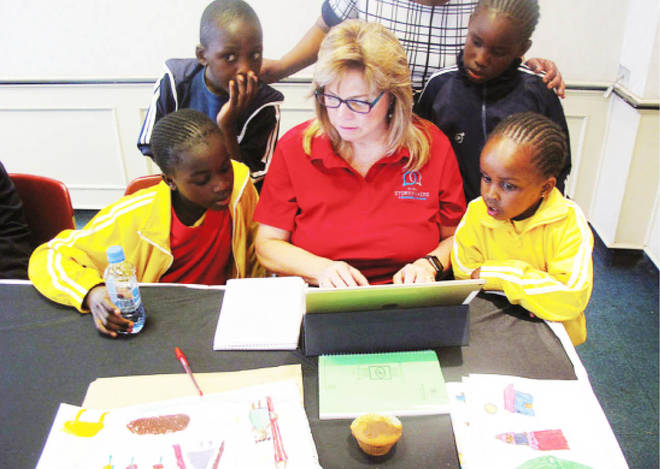Why learning should be in every language – Sherry Sacino
Sherry Sacino is Chief Innovation Officer of Global Storymakers, a storytelling community that strives to help children read and write, especially in their mother tongue. Here, she talks about the objectives of Global Storymakers, why she met with Nigerian writers and publishers and more. Excerpts: Why did you decide to meet up with writers […]


Sherry Sacino is Chief Innovation Officer of Global Storymakers, a storytelling community that strives to help children read and write, especially in their mother tongue. Here, she talks about the objectives of Global Storymakers, why she met with Nigerian writers and publishers and more. Excerpts:
Why did you decide to meet up with writers and publishers in Abuja, Nigeria?
Because this country is very progressive and they care about having their children learn, especially in their mother tongue and other languages, so they can grow and contribute to their society. This starts with learning and reading.
 |
What is your expectation from writers and publishers that you have met with?
I hope they want to write their own books and share it with the world. I also hope they want to teach the children how to write. They can do all of that through the Global Storymaking platform.
How does the Global Storymakers platform work?
If a publisher decides that they have a certain theme, be it science or math, or basic alphabet for early learners. They can create a book online by working with a community of storytellers, artists, book designers and illustrators to actually make that book come to life. So, it’s a very good and efficient platform for the publisher to work with. They can then print them or make electronic copies.
This is your first time in Nigeria, but you have worked in other African countries. What has the experience been like so far?
I’m inspired by the fact that so many people want their children to learn. There’s so much motivation and a lot of resources put into children learning.
You seem to have a particular interest in children. What have you observed about Africa as regards children’s literature?
Using the national language policy by design leaves the people behind. I don’t think that is any governments intention, but when the national language policy is limited to certain languages, that means the people who don’t speak those languages can not learn at the same rate. I think it is very important that learning is opened up to everybody, in every language. That is my goal and that is what we do with Global Storymakers.
 |
Global Storymakers is an online platform where you are able to help teachers and parents ignite writing passion in children. What methods have you employed that has made this successful?
We hold one-on-one workshops, and use other strategies to get people to understand how easy it is to actually write a book. We wrote, illustrated and produced a book in three hours with children. One thing I learned the most is that, children have a much stronger imagination than we give them credit for.
How would you say written communication helps in building self-esteem in children and among people in a community?
It isn’t actually the written communication itself, but the ability to know how to communicate anything. When people respond favourably to your ideas, it gives you self-esteem. Knowing how to put together a story, write a story, knowing how to communicate how you feel, or an idea, helps elevate you and your contribution to society. That always builds self-esteem. I absolutely guarantee it.
Your non-profit organizations, Youth Empowerment Alliance, and Youth Outland, has been a key contributor to global policies impacting children. Can you mention a few of those policies?
We worked on policies aimed at protecting children after natural disasters and hurricanes that hit the United States and in Thailand. Children were not protected the way they should. It also works with those who are separated from their parents. Anytime children participate in their own lives, the solution is much better. When policies are being made about people who are not participating in the process, it wouldn’t be as good as it could be.
You have written about nine children’s books and a legal book. How would you describe your journey as a writer and author?
I have to write. If I don’t, I get uncomfortable. When someone passes away I write a eulogy. When I am happy I write, I do the same when I have something funny to share. So, if you put enough of those together, you end up with a book.
What challenges have you faced?
I tend to take control of my writing. It’s a problem when you write and submit to someone and they have to judge it. I don’t do that. The more you write, the better you get at it.
You are currently the chairwoman of the International Advisory Board of African Institute for Children Studies in Nairobi. You are also on the leadership team of the Global Book Alliance committed to creating a world with 250 million literate children. How successful has this campaign been so far?
It has just been recently launched, so there is a lot of research about the need for it, and this is addressing that need, which is to be fulfilled by the year 2030.
What’s your favourite book?
My favourite is the last I wrote. It’s called ‘Maasai Life’. It’s for teenagers, and it is about the Masaai culture.
How did the local people receive ‘Masaai Life’?
They were so excited and it was like fireworks in the sky. They laughed and embraced each other. It’s written in first person, so it’s their story from them, and not my interpretation based on what I see. I don’t know what I see, but they know what is going on. I asked them about their life and what they feel. It’s about their everyday life.
